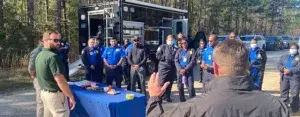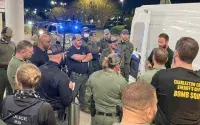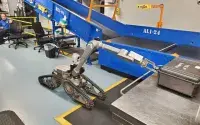
TSA South Carolina teamed up with the Charleston County Bomb Squad (CCBS) to hold an explosives exercise, training TSA security officers on how to recognize and respond to improvised explosive devices (IEDs). TSA explosives specialists Mark Chapman and Chris Lewis co-hosted the training with the bomb squad for 26 TSA employees at the CCBS range in Ravenel, S.C.
The demonstration provided explosives training to Charleston International Airport (CHS) TSA officers who were unable to attend new hire training in-person during the COVID-19 pandemic. The TSA explosives specialists trained the officers on what to look for when an explosive trace detection alarm goes off, while the bomb squad detonated various explosives to show the effects of IEDs in an airplane.
The explosives experts modeled the exercises after examples of aviation attacks such as the 2001 shoe bomb attempt, blowing up a pair of shoes to show how destructive a small amount of explosives can be.
The South Carolina TSA explosives specialists team trains TSA officers to get a better understanding of the types of explosives and other prohibited items they might encounter at the checkpoint and how to identify and respond to incidents.
Chapman and Lewis conducted an Explosives Boot Camp for lead and supervisory TSA officers prior to conducting the explosives demonstration with the CCBS. At the boot camp, Chapman and Lewis emphasized the importance of TSA’s layered security approach in which employees from multiple TSA teams work together and share knowledge to ensure they detect threats and handle incidents to achieve the mission.
They stressed what is required when responding to an IED incident: having a threat detection mindset, knowing the TSA standard operating procedures, engaging with personnel, and mastering TSA tools and techniques.
“The opportunity for our officers to experience the Explosives Boot Camp has provided them the link to understanding the impact to prohibited items, our mission and importance to follow procedures,” said TSA South Carolina Federal Security Director David McMahon.
Two days after the explosives demonstration, TSA partnered with the Charleston city and county bomb squads to conduct additional training exercises involving various scenarios at CHS. The teams deployed robots to determine whether bags contained threats and how to best respond to incidents.
The collaboration between TSA South Carolina and the Charleston county and city bomb squads provides CHS TSA officers with world-class training so they have the skill sets necessary to ensure explosives or IEDs do not get onto airplanes.
“Our partnerships and conducting regular training exercises allow us to build a stronger relationship should that time come to respond to an actual event,” McMahon said. “These two bomb squads serve as our primary response teams to Charleston International Airport. I am extremely pleased with the training activities that have been conducted by our TSS-Es [Transportation Security Specialists-Explosives] because it demonstrates our commitment to the TSA mission and providing first-class security to the community we serve.”
Chapman and Lewis, as part of the Threat Assessment Countermeasures Team, interact with TSA officers on a daily basis at the state’s six federalized airports.
“I would argue the most important partnership in all of TSA is between a TSS-E and a TSO [Transportation Security Officer],” said Chapman. “We as TSS-Es have to be able to teach what we know about IEDs to TSOs, and they have to absorb it and then apply it on the frontlines. That intricate partnership is the key to keeping bombs off planes. We’re a family, that’s who we are and that’s what we do.”
From TSA Strategic Communications & Public Affairs



